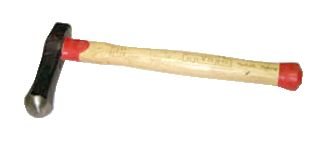Hi Dwane!
For starting out, I would encourage you to find a standard cross or straight peen hammer until you learn how to manipulate the hammer. Hammers such as the one you posted a pic of are not what I consider a good choice for beginners. The reason I say that is because they are more difficult to control and direct, which can be very frustrating for a beginner.
For cheap, usable hammers, go to your local second hand store or pawn shop....you can generally find usable hammer heads for a couple of dollars, then go to the hardware store and buy a new handle or two. ALWAYS use ONLY wood handles for your forging hammers! Fiberglass, steel, or other materials will transmit the shock of hammering up your arm, and will quickly wear you out.
Grind/clean up you hammer faces to a mild dome shape, with a finish just as fine as you can make it (all my hammer faces are mirror finished). Of course I would love to recommend one of my hammers to you, but that's not what your looking for right now. The best thing you can do for yourself at this stage is to stick with traditional pattern hammers, and LEARN how the hammer moves the hot steel. Once you get a good grip on hammer control and understand how the motions you make effect how the steel moves, then you'll be able to use just about any hammer design you'd like. Traditional style hammers will make it somewhat easier for you learn.....but the wrong choice in the beginning (like the one pictured) can make things more difficult....and you don't need that.
Before anyone thinks I'm dissing that style of hammer....I'm not. The style of hammer in the picture is an excellent choice for EXPERIENCED forgers. My reasons for NOT recommending it to a beginner is due to how far off center the handle is....while that is a benefit for advanced forgers, it makes the hammer difficult for a beginner to control. The thought pattern often is...."with that weight towards the face, it will hit harder!" In the hands of an experienced person that can be so, but this game is not always about power.....control is paramount when Bladesmithing. If you learn how to control/manipulate the hammer to achieve what you desire, your ahead of the game. Power without control is nothing more than making a mess.



